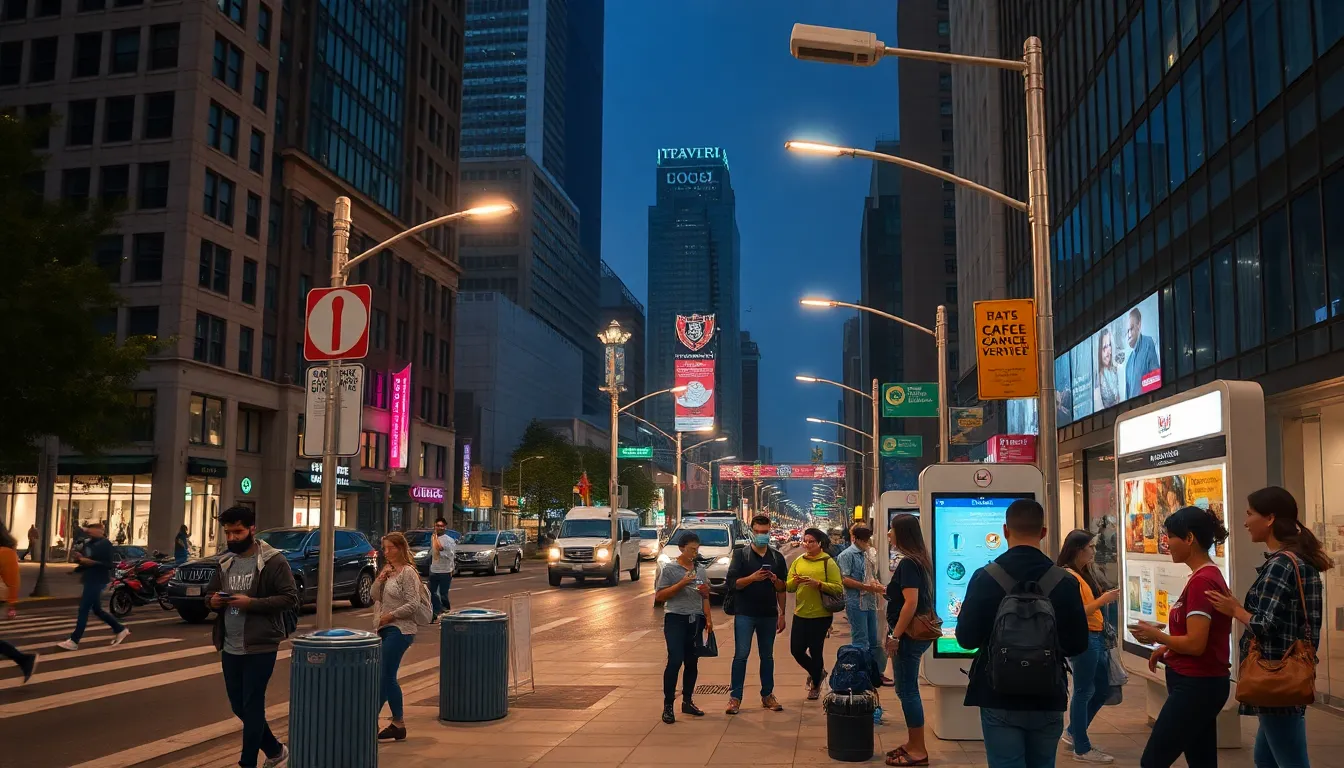In today’s rapidly evolving urban landscape, municipal technology is transforming the way cities operate and engage with their citizens. As governments seek smarter solutions to tackle challenges like traffic congestion, resource management, and public safety, innovative tech tools are stepping in to streamline processes and enhance service delivery.
From smart traffic lights to waste management systems powered by data analytics, municipal technology is not just a trend; it’s a necessity for modern cities striving for efficiency and sustainability. By leveraging these advancements, municipalities can improve communication, reduce costs, and create a more responsive environment for residents. As cities embrace this digital revolution, the potential for improved quality of life and civic engagement grows significantly.
Table of Contents
ToggleOverview of Municipal Technology
Municipal technology encompasses the tools, systems, and platforms that enable cities to enhance their operations and services. By integrating innovative solutions into urban management, municipalities tackle challenges like traffic workflow, energy efficiency, and citizen engagement. Examples of municipal technology include:
- Smart Traffic Management Systems: These systems utilize real-time data to optimize traffic flow, reducing congestion and improving travel times. Sensors and cameras collect traffic data, which is analyzed to adjust signal timings dynamically.
- Data-Driven Waste Management: Municipalities employ smart waste bins equipped with sensors to monitor fill levels. This technology schedules collection routes optimally, increasing efficiency and reducing operational costs.
- Public Safety Solutions: Municipal technology enhances emergency response through integrated communication platforms. These systems facilitate quicker responses by connecting dispatch centers with first responders in real time.
- Community Engagement Tools: Digital platforms foster improved communication between citizens and local governments. Citizen feedback apps enable residents to report issues and provide input on city projects, creating a more engaged community.
- Energy Management Systems: Smart grids give municipalities the ability to monitor and manage energy consumption effectively. This technology increases reliability, encourages sustainability, and reduces costs for both the city and its residents.
Municipal technology not only streamlines operations but also promotes sustainability and civic involvement, ultimately leading to improved quality of life for urban populations.
Key Components of Municipal Technology

Municipal technology consists of various components that work together to improve city management and services. These key components are integral in fostering smarter, more efficient urban environments.
Smart Infrastructure
Smart infrastructure encompasses advanced systems that monitor and manage city assets. Examples include connected streetlights that can adjust brightness based on real-time activity, intelligent transportation systems that provide traffic updates, and sensor-equipped waste bins that notify sanitation departments when they’re full. By employing such infrastructure, cities can increase operational efficiency, reduce energy consumption, and improve public safety.
Data Management Systems
Data management systems leverage big data to enhance decision-making processes. These systems capture and analyze vast amounts of information from various sources, including social media, sensors, and public records. For instance, geographic information systems (GIS) enable city planners to visualize demographic trends and optimize land use. Additionally, analytics platforms support predictive modeling, helping municipalities identify potential issues like traffic bottlenecks or equipment failures before they occur.
Citizen Engagement Tools
Citizen engagement tools promote communication between local governments and residents. Platforms such as mobile apps and online portals allow citizens to report issues, access municipal services, and provide feedback on community matters. Examples include real-time dashboards displaying city data, public forums for discussing local policies, and chatbot services for answering residents’ inquiries. By enhancing citizen engagement, municipalities foster a collaborative atmosphere, driving greater participation in governance and community initiatives.
Benefits of Municipal Technology
Municipal technology brings numerous advantages to urban environments, enhancing operations and improving the quality of life for residents. Key benefits include improved efficiency, enhanced public services, and significant cost savings.
Improved Efficiency
Municipal technology streamlines various operations by automating processes and utilizing real-time data. Smart traffic management systems adjust traffic signals based on current flow, reducing congestion. Data-driven waste management systems signal when containers are full, optimizing collection routes. Integrated platforms for public safety coordinate emergency response efforts, allowing quicker deployment of resources. These technologies collectively minimize delays and enhance the overall efficiency of city services.
Enhanced Public Services
Municipal technology transforms public services, making them more responsive and accessible. Online platforms enable residents to report issues like potholes or broken streetlights, fostering direct communication with local governments. Mobile applications provide citizens with real-time information on public transportation and community events, improving engagement. Additionally, sensors and monitoring systems proactively address public safety concerns, ensuring quicker responses to emergencies. Overall, these advancements elevate the quality of public services provided to citizens.
Cost Savings
Implementing municipal technology results in substantial cost savings for cities. Automation reduces the need for manual labor, leading to decreased operational expenses. Smart energy management systems lower utility costs by optimizing consumption patterns. Enhanced resource allocation and waste reduction through data insights further minimize expenditures. These cost-effective measures allow municipalities to allocate funds to other essential services, ultimately benefiting the community.
Challenges in Implementing Municipal Technology
Implementing municipal technology presents several challenges that cities must navigate effectively. Addressing these issues is crucial for realizing the full potential of smart city advancements.
Budget Constraints
Budget constraints significantly impact municipal technology projects. Many local governments face tight financial resources, limiting their ability to invest in new technologies. Estimated costs for technology upgrades can reach millions, making it difficult to prioritize funding for these initiatives. Additionally, ongoing maintenance and operational expenses can strain budgets further. Ensuring that technology solutions align with long-term financial strategies is vital for successful implementation.
Data Privacy Concerns
Data privacy concerns pose notable challenges in adopting municipal technology. Cities collect vast amounts of data from residents, and any breaches or misuse can lead to public distrust. Compliance with regulations, such as the General Data Protection Regulation (GDPR), adds complexity to data management. Transparent data usage policies and robust security measures are essential for safeguarding sensitive information and maintaining citizens’ trust in municipal systems.
Integration with Existing Systems
Integration with existing systems presents a technical challenge for municipalities. Many cities rely on outdated infrastructure and legacy systems that may be incompatible with new technologies. Ensuring seamless integration requires careful planning, specialized expertise, and potential system overhauls. Failure to achieve compatibility can lead to data silos and inefficiencies, undermining the intended benefits of municipal technology. Engaging stakeholders early in the process fosters a collaborative approach, promoting smoother transitions during the integration phase.
Future Trends in Municipal Technology
Municipal technology continues to evolve, embracing innovations that enable smarter, more sustainable urban environments. Key trends include the integration of AI and machine learning, alongside sustainable solutions that reshape city management.
AI and Machine Learning Integration
AI and machine learning play pivotal roles in optimizing municipal services by analyzing data and improving decision-making. Cities leverage predictive analytics to manage traffic flow, reduce congestion, and enhance public safety. For instance, AI algorithms process real-time traffic data, enabling dynamic signal adjustments at intersections, which significantly improves flow and minimizes delays. Furthermore, machine learning models analyze waste collection patterns, optimizing routes and schedules. By automating these processes, municipalities reduce operational costs and serve their communities more effectively.
Sustainable Solutions
Sustainable solutions in municipal technology emphasize eco-friendly practices and resource efficiency. Smart energy management systems monitor consumption and predict usage patterns, allowing cities to reduce energy waste and lower costs. Additionally, green infrastructure, such as permeable pavements and urban green spaces, integrates with smart systems to manage stormwater runoff effectively. Cities also implement sensor-equipped waste bins that monitor fill levels, optimizing collection schedules and minimizing carbon footprints. These sustainable practices not only mitigate environmental impact but also enhance the overall quality of urban life, aligning with broader goals of sustainability and resilience in city planning.
Municipal technology is revolutionizing urban living by creating smarter and more efficient cities. As municipalities embrace innovative solutions they enhance public services and improve the quality of life for residents. The integration of advanced technologies not only streamlines operations but also fosters greater civic engagement and sustainability.
While challenges like budget constraints and data privacy concerns exist addressing these issues is essential for maximizing the benefits of municipal technology. By prioritizing collaboration and transparency local governments can pave the way for a more connected and responsive urban environment. The future of city management lies in the continuous evolution of these technologies ultimately shaping vibrant communities that thrive on innovation and inclusivity.





